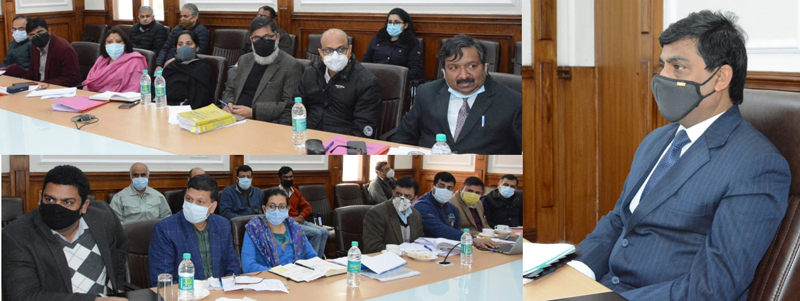Make urban areas litter free by March: CS to H&UDD
Excelsior Correspondent
JAMMU, Dec 17: As a major relief to 4.5 lakh employees serving in various departments across the UT of J&K, Chief Secretary, Dr. Arun Kumar Mehta launched an online portal for submission of yearly property returns mandated by the Employees Conduct Rules. It replaces the existing cumbersome system of manual filing and is aimed at ensuring the ensure timely compliance by all government employees.
The Additional Chief Secretary, Finance Department, Principal Secretary, General Administration Department, Director, Anti Corruption Bureau, CEO, JAKEGA and Director, IT&SS, University of Kashmir were present on the occasion.
The portal has been developed as a collaborative venture between the General Administration Department, Information Technology Department, Anti-Corruption Bureau, and the University of Kashmir and is extremely convenient and user-friendly.
The new portal will facilitate access and monitoring of the property details of all employees especially while processing vigilance clearances in their favour, besides assisting the Anti Corruption Bureau in investigating the cases of disproportionate assets expeditiously.
The Government employees can conveniently log in using their CPIS No. and OTP verification, fill up/submit their property return statement, and download/take print of the same for record-keeping. Similarly, the DDOs can also monitor and assess compliance from all concerned employees.
The Government employees can now submit their property details on the portal https://prs.jk.gov.in, for the calendar year 2021 between 1st and 31st January, 2022.
Meanwhile, Chief Secretary, Dr. Arun Kumar Mehta reviewed the functioning of the Housing & Urban Development Department and took stock of the progress under developmental programmes and schemes.
Principal Secretary, Housing & Urban Development, Commissioner Secretary, Jal Shakti, Commissioner, Jammu Municipal Corporation, Commissioner, Srinagar Municipal Corporation, Directors Urban Local Bodies Jammu and Kashmir along with concerned officers participated in the meeting.
Regarding, the Mass Rapid Transit System-Metrolite (MRTS), it was informed that the two projects coming up in the twin capital cities, on completion, will provide a safe, reliable, convenient, cost-effective, and sustainable mode of urban transportation.
The Metrolite corridors will run from Bantalab to Bari Brahmana (23 km) in Jammu, Indra Nagar to HMT Junction (12.50 km), and Hazuri Bagh to Osmanabad (12.50 km) in Srinagar. Once functional, MRTS will promote public transportation with a corresponding reduction in traffic congestion by reducing per capita vehicle ownership and also the per capita traffic accidents.
Under the Atal Mission for Rejuvenation and Urban Transformation (AMRUT), 64 projects have been completed and the remaining 19 will be completed by March 2022 at an estimated cost of Rs. 513.13 crore.
To further boost development in the urban areas, AMRUT 2.0 is being launched for 5 years with a target of providing water tap connections to all statutory towns; sewerage connections in 3 AMRUT mission cities; and rejuvenation of water bodies, green spaces, and parks.
The Chief Secretary directed the Department to ensure ‘litter-free’ urban areas by 2022 and implementation of scientific waste management techniques including safe disposal in landfills. The Department was advised to convert all legacy dumpsites into green zones through appropriate interventions.
Further, the Chief Secretary emphasized the financial and environmental sustainability of developmental works/models being executed through various local governance bodies and directed formulation of guiding principles and framework. The Department was asked to lay special focus on capacity building and training of both the elected members and employees of all urban local bodies.
The Department was also advised to evolve performance-linked incentives to reward the municipalities registering good performance in reform implementation.


